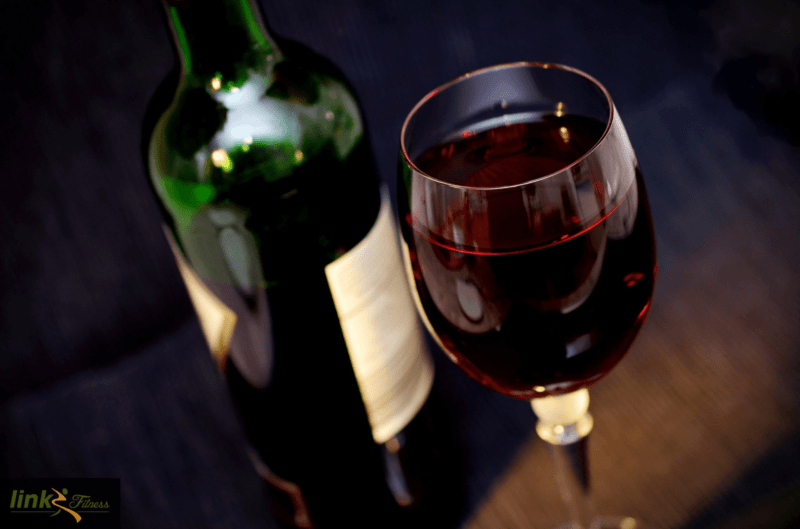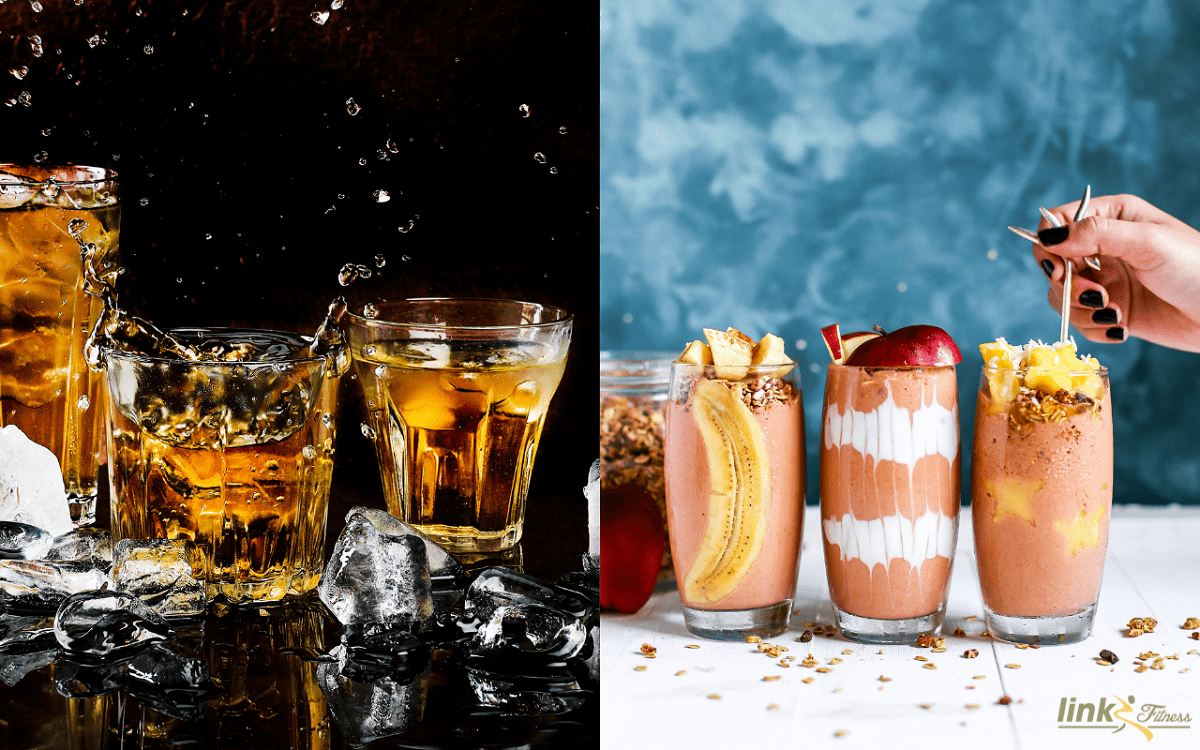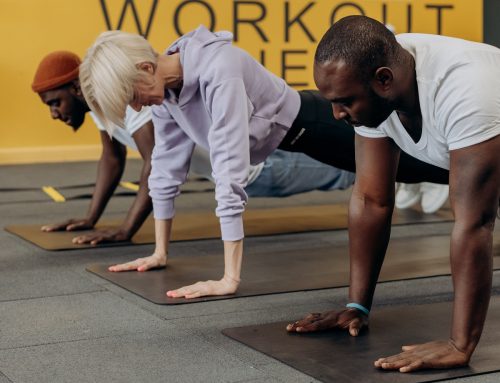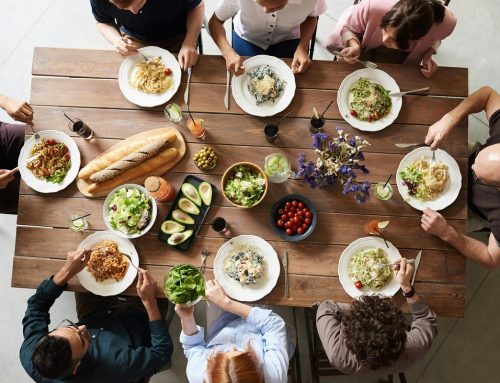You’re on a mission to achieve that lean physique. You’re counting calories, hitting the gym, and making healthy choices. But, an obstacle hiding in your social life stops your progress. We’re talking about alcohol consumption. Those post-work drinks and weekend cocktails can add up faster than you realize and derail your weight loss journey.
Before you panic, take a deep breath. Reaching your fitness goals and enjoying occasional social drinks aren’t arch enemies. But it’s crucial to understand why alcohol consumption can make your weight loss journey feel like an uphill climb.
In this article, I’ll shed light on the science, debunk some myths, and equip you with practical tips to navigate this balance. So, let’s explore why alcohol consumption and weight loss don’t see eye-to-eye.
The Calorie Cost of Alcohol

Alcohol isn’t exactly known for its nutritional value. Unlike nutrient-rich foods that fuel your body and keep you satiated, alcoholic drinks have empty calories. These calories provide energy but little to no essential vitamins, minerals, or fibre. They don’t contribute anything meaningful to your body.
Counting the Costs
A single gram of alcohol contains 7 calories, compared to 4 calories per gram of carbohydrates and protein. That means a standard glass of wine (150 ml) can set you back around 120 calories, while a 300 ml beer packs about 150 calories.
And don’t forget sugary mixers and cocktails, which can double or triple the calorie count. For this reason, that “harmless” drink becomes a big chunk of your daily calorie budget, leaving less room for nutritious foods that keep you full longer.
The Hidden Culprits
But the story doesn’t end there. Many people underestimate the extra calories that come with bar snacks or food eaten under the influence of alcohol. Mindless eating of salty fries or pizza while drinking adds even more unwanted calories to the equation.
Alcohol consumption lowers your inhibitions, making it easier to indulge in unhealthy food choices you wouldn’t even touch when sober.
The Bottom Line
While an occasional drink can’t derail your progress entirely, understanding the calorie cost of alcohol and its sneaky companions is crucial. By making informed choices and being mindful of your food portions, you can minimize the impact of drinking alcohol on your fitness.
Now, let’s look into how alcohol affects your body’s ability to burn fat, another major hurdle on your fitness path.
The Effect of Alcohol On Fat-Burning

Imagine your body as a fat-burning furnace working at converting calories into energy. Now, picture pouring a glass of alcohol on that fire. That’s what alcohol consumption can do to your metabolism.
Instead of burning fat, your body focuses on processing the alcohol first and instead puts fat-burning on hold. This metabolic slowdown means fewer calories get torched, making weight loss more challenging.
How it Works
Here’s the science behind the struggle: when you drink alcohol, your liver prioritizes its breakdown over other tasks, including breaking down fat. This process creates a metabolic traffic jam, leading to increased fat storage and decreased fat burning.
Also, alcohol consumption can suppress levels of glucagon, a hormone that signals your body to release stored fat for energy. So, not only is your fat burning on hold but your fuel reserves are locked away too.
Beyond the Liver
The impact of alcohol consumption on your metabolism doesn’t stop in the liver. It can also interfere with muscle protein synthesis, the building and repairing of muscle tissue. More muscle equals a faster metabolism, so hindering its growth slows your calorie-burning potential further.
The Reality Check
While research suggests that moderate alcohol consumption can’t significantly impact metabolism in everyone, chronic heavy drinking can stop weight loss.
Understanding these effects empowers you to make informed choices and focus on strategies that will keep your metabolic fire burning.
Alcohol and Overeating
Remember the mindless munching that accompanies drinking alcohol? It’s not just your imagination playing tricks on you. Alcohol consumption affects your judgment and decision-making abilities, including your choices around food. When your inhibitions take a vacation, healthy eating habits often follow suit.
Food Cravings
Alcohol stimulates the release of dopamine, a neurotransmitter linked to pleasure and reward. Dopamine then triggers cravings for sugary, salty, and fatty foods, leading to impulsive eating that wouldn’t be as tempting in a sober state. And because of this, that healthy salad you packed for later looks less appealing than the pizza down the street.
Portion Control Takes a Dive
Not only does alcohol consumption increase cravings, but it can also impair your ability to control your portions. Remember the metabolic slowdown mentioned earlier?
It can leave you hungrier, pushing you to eat more to compensate. Couple that with impaired judgment, and you have a recipe for overindulging beyond your usual calorie needs.
The Hangover Hunger Games
As if the immediate impact on food choices wasn’t enough, alcohol consumption can also wreak havoc on your eating habits the next day. Hangovers often come with dehydration, fatigue, and low blood sugar, all of which can trigger intense cravings for unhealthy comfort foods. Sugary drinks, breakfast sandwiches, or carb-heavy meals may seem like a quick fix, but they further sabotage your weight loss goals.
Taking Back Control
Being aware of how alcohol consumption affects your food choices is the first step to taking back control. Planning healthy snacks, picking lower-calorie drinks, and deciding to eat less before you start drinking can help reduce the temptations. Remember, learning to make mindful choices when enjoying social drinks can make a big difference in your weight loss journey.
Next, let’s explore how alcohol consumption can impact your exercise routine.
The Alcohol and Exercise Equation
You head to the gym, all fired up and excited to push yourself to your limits. But, you remember that last night you had too much to drink. Those extra drinks you had mess up your fitness goals more than you comprehend.
Hydration Hangover
Alcohol is a diuretic, meaning it increases your body’s fluid loss. This dehydration carries over well into the next day and affects your workout performance. Dehydration also leads to fatigue, low muscle strength, and poor coordination. Being in such a state makes even your usual routine feel like an uphill battle.
Performance Drops
Beyond dehydration, alcohol consumption affects your body’s ability to use energy well. It interferes with glucose metabolism, the breaking down of carbohydrates into ready fuel for your muscles. This means you’ll have less energy for your workout, leading to poor stamina, slower recovery times, and a mediocre performance.
Low Motivation
Let’s not forget the motivational impact of alcohol consumption. Hangovers often result in feelings of lethargy, low energy, and reduced focus, making going to the gym far less appealing. This can disrupt your workout routine and lead to missed sessions, hindering your progress.
But all is not lost. Understanding how alcohol affects your exercise routine empowers you to make adjustments. Ensure you drink enough water before, during, and after drinking. Also, planning workouts earlier in the day to avoid post-drinking fatigue and choosing lower-alcohol options or opting for alcohol-free alternatives on workout days can reduce its impact a lot.
Moving Forward
Remember, achieving your fitness goals is a journey, not a sprint. Occasional alcohol consumption doesn’t have to derail your progress entirely. By making informed choices, planning, and practising healthy habits most of the time, you can overcome the challenges and still reach your fitness goals.
How can you balance alcohol consumption with your weight loss journey and be able to make informed choices for your health and fitness?
Tips for Finding a Happy Medium
We’ve explored the impact of alcohol consumption on your weight loss journey. We’ve covered hidden calories, metabolic slowdowns, poor food choices and exercise woes. So, does this mean you have to say goodbye to social drinks forever? Not at all. The key lies in balancing enjoyment with mindful choices and practical strategies.
1. Practice Moderation
The most important thing is not about complete abstinence but about mindful consumption. Stick to the recommended guidelines: one drink per day for women and two for men. But above all this, listen to your body and adapt accordingly. If you struggle with moderation, the other best alternative that is guaranteed to work is to cut it out.
2. Be Calorie Conscious
Another valuable tip is to choose lower-calorie drinks like spirits with water or club soda, light beers, or dry wines. Avoid sugary mixers and instead opt for natural flavourings like fruits or herbs. Remember, controlling how much you drink is vital. So use smaller glasses and savour your drink slowly.
3. Plan Your Indulgences
Instead of spontaneous drinking, plan social events where you can make informed choices. Set limits beforehand and stick to them. Pair your drinks with healthy snacks like nuts or veggies to curb unhealthy cravings.
4. Prioritize Hydration
Alcohol dehydrates, so counterbalance by drinking plenty of water throughout the day and more before, during, and after consuming alcohol. Staying hydrated helps with health, metabolism, and exercise performance.
5. Fuel Your Body Right
Don’t skip meals before or after drinking. Eat nutritious, balanced meals to keep your energy levels up and cravings at bay. Choose healthy options that promote satiety and prevent impulsive decisions.
6. Listen to Your Body
Pay attention to how you feel after consuming alcohol. Do you experience excessive cravings, fatigue, or difficulty exercising? Use these observations to adjust your choices and find a balance that works for you.
7. Don’t Beat Yourself Up
Life happens, and there might be times when you overindulge. Don’t let setbacks define you. Do whatever it takes to get back on track with healthy choices and remember that it’s all about progress, not perfection.
8. Seek Support.
If you struggle with alcohol consumption, don’t hesitate to seek professional help. Talk to your doctor or therapist to develop ways to manage your relationship with alcohol and achieve your weight loss goals.
Always strive for balance. By implementing these tips and making informed choices, you can enjoy your social life and stay on top of your health and fitness.
Conclusion: Take it a Day at a Time
So, there you have it. Alcohol consumption and weight loss can coexist, but it requires awareness, planning, and making mindful choices. Your journey is unique and, what works for someone else might not work for you. Experiment, find your balance, and don’t be afraid to adjust as needed.
References:
- Alcohol intake and its effects on energy metabolism in humans: [https://pubmed.ncbi.nlm.nih.gov/21030527/]
- Alcohol consumption and food intake: [https://pubmed.ncbi.nlm.nih.gov/23405862/]






